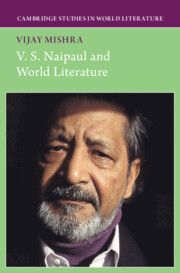Book contents
- V. S. Naipaul and World Literature
- Cambridge Studies in World Literature
- V. S. Naipaul and World Literature
- Copyright page
- Dedication
- Contents
- Figures
- Acknowledgments
- Prologue
- Introduction
- Chapter 1 V. S. Naipaul Aesthetic Ideology and World Literature
- Chapter 2 “The English Language Was Mine; The Tradition Was Not”
- Chapter 3 The Indenture Social Imaginary
- Chapter 4 Empires, Slaves, Rebels, and Revolutions
- Chapter 5 In the Shadow of the Master
- Chapter 6 The Travel Book and Wounded Civilizations
- Epilogue
- Notes
- Works Cited and Select Bibliography
- Index
Chapter 1 - V. S. Naipaul Aesthetic Ideology and World Literature
Published online by Cambridge University Press: 01 February 2024
- V. S. Naipaul and World Literature
- Cambridge Studies in World Literature
- V. S. Naipaul and World Literature
- Copyright page
- Dedication
- Contents
- Figures
- Acknowledgments
- Prologue
- Introduction
- Chapter 1 V. S. Naipaul Aesthetic Ideology and World Literature
- Chapter 2 “The English Language Was Mine; The Tradition Was Not”
- Chapter 3 The Indenture Social Imaginary
- Chapter 4 Empires, Slaves, Rebels, and Revolutions
- Chapter 5 In the Shadow of the Master
- Chapter 6 The Travel Book and Wounded Civilizations
- Epilogue
- Notes
- Works Cited and Select Bibliography
- Index
Summary
Chapter 1 argues that V. S. Naipaul’s works are critically co-extensive with world literary formations and demonstrably foundational to the conception of the modern idea of world literature. Naipaul’s entry into world literature is via a writing that reads the literary world as an aesthetic totality. Kant’s critique of judgement is critical here even if Naipaul departs from Kant who read human cognition as discursive and not intuitive. Naipaul’s aesthetics is grounded in an intuitive mode of human cognition. His idea of “seeing” (and here he means “critical seeing”) via a “sensible intuition” is the basis of all his writings. Naipaul’s declaration of the primacy of the intuitive intellect – Proust is cited as exemplary – in the artistic process has no need for concepts or guiding principles, a prior idea or even a politics. However, Naipaul heeds Kant’s warning that if we were to rely purely on intuition – which would generate a non-contingent world with no distinction between objects that are real and those merely possible because all objects for the intuitive intellect are real – there would be no universal concepts generated by understanding and only individual representations grasped directly and immediately.
Keywords
- Type
- Chapter
- Information
- V. S. Naipaul and World Literature , pp. 13 - 29Publisher: Cambridge University PressPrint publication year: 2024

